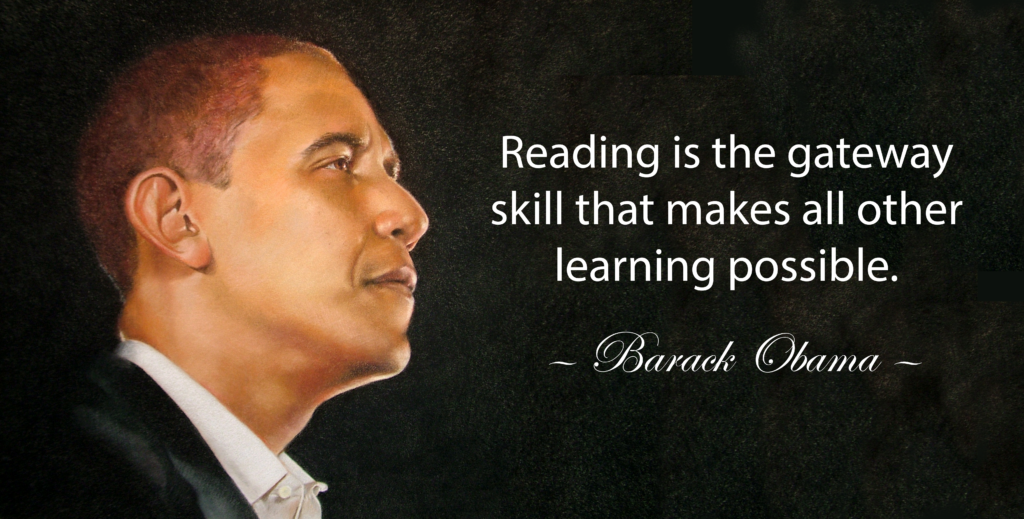Instructional Approaches to Ignite the Love of Reading in Adult Learners

by Susan Hickman
 How many of your adult learners tell you that they love to read? If your demographic is similar to mine, your answer is “very few.” In fact, probably even more profound is the realization that “very few” of our adult learners read at all. Sure, they come to class each week and read along with their teacher and classmates, but that is very likely the extent of their reading experience. How can we remedy this predicament and why do we need to? In a 2005 speech titled “Literacy and Education in a 21st Century Economy,” former President Barack Obama is credited with saying the following: “Reading is the gateway skill that makes all other learning possible.” This is the answer to why we, as adult educators, must find ways to engage our students in reading and foster a love of reading.
How many of your adult learners tell you that they love to read? If your demographic is similar to mine, your answer is “very few.” In fact, probably even more profound is the realization that “very few” of our adult learners read at all. Sure, they come to class each week and read along with their teacher and classmates, but that is very likely the extent of their reading experience. How can we remedy this predicament and why do we need to? In a 2005 speech titled “Literacy and Education in a 21st Century Economy,” former President Barack Obama is credited with saying the following: “Reading is the gateway skill that makes all other learning possible.” This is the answer to why we, as adult educators, must find ways to engage our students in reading and foster a love of reading.
Building active readers begins with basic skills that our adult learners may never have gained, which results in reading being something that frustrates them and that they do not enjoy. The major components of reading include decoding, fluency, vocabulary, and comprehension. Our students need direct instruction in these skills in order to become comfortable with reading—the first step to wanting to read.
Without the knowledge of how to recognize sounds represented by letters and blend those sounds, a potential reader has already hit a roadblock. I find that allowing students to read aloud in class from a common text gives them practice in decoding. Once students who are reluctant to read aloud have heard other classmates struggle, they are likely to not feel so intimidated and are then willing to take a turn. Fluency (reading with accuracy and expression) follows decoding. As students read and hear themselves reading, their confidence will grow and so will their fluency. Reading is a practiced skill, so practice is essential for students to grow as readers. Choosing vocabulary-rich text is the best way to increase vocabulary. When students can see unknown words in context, they will expand their vocabulary using context clues. And finally, comprehension is our ultimate goal in growing proficient readers. Once students can read with fluency and comprehension, they have opened the world of the written word and reading is no longer a frustration, but a joy.
I have several approaches that have worked for me. Number one is finding engaging text. Many of our students never finished high school because they were bored and did not see the relevance of the subject matter. As Reading Language Arts (RLA) teachers, we have a plethora of real-world material that our students can read, enhancing their knowledge of science, social studies, and current events. I believe that we need to meet them where they are in their adult lives. Informational topics such as the militarization of police, fake news, social media, and gamification are all topics of interest to our learners. There are also compelling and timeless short stories that can be used to teach the elements of literature as well as literary devices. In my class, we talk to each other—giving opinions, making predictions, and drawing conclusions. An interactive class, especially through Zoom which is how I am teaching now, is paramount.
I have taught several novels during my tenure in adult education. When I was still teaching in-person classes, our entire region taught A Lesson Before Dying by Ernest J. Gaines. This was manageable because we could read together in class. I did not have success with students reading this outside of class. A much easier book that I have used is Seedfolks by Paul Fleischman. This little gem is 710L reading level, so it does not present difficulty and frustration for even readers who struggle. The story is compelling and with it are life lessons about diversity and acceptance.
For several years, I have taught an eight-session course in June and used Night by Elie Wiesel. Each year I consider choosing something else, but I just cannot move away from this eloquent telling of a horrific time in history. When a student said that he had never read an entire book but that he could not put this book down, I knew I had chosen well. I set the classes up in Google Classroom and include a copy of the text, which I have annotated. In addition, each student has a personal copy of the book but can read the homework from my text if preferred. Each week, we look at a different literary aspect that Wiesel uses to “keep memory alive.” The study starts with historical background to establish the setting, as well as the author’s purpose (Wiesel’s Nobel Peace Prize Acceptance Speech). I use YouTube videos and personal instruction to teach irony, imagery, figurative language, symbolism, and theme. We discover these elements and devices as we go over portions of the text which they have read for homework. Each week, we have a “quiz” covering the material they have been assigned, basically to hold them accountable. We conclude with an interview with Wiesel to know him and his dedication to the fight for human rights and human dignity. Is this teaching reading skills? Yes. Is it teaching decoding, fluency, vocabulary, and comprehension? Yes. Is it teaching about humanity and citizenship? Yes. Is it promoting lifelong learning, reading for pleasure, and increased civic responsibility? I hope so.
Our job as adult educators is to provide a salve to heal the wounds of failure in most of our students and to equip them with the skills they need in a fiercely competitive and increasingly technological world. We want them to have higher incomes, less unemployment, and access to a world of learning that they will want for the rest of their lives. In the words of Dr. Seuss: “The more you read, the more things you will know. The more you learn, the more places you’ll go.”
 Susan Hickman is an Adjunct Adult Education Instructor with Southside Virginia Community College. She is starting her twelfth year teaching GED® classes to adult learners, having begun with the program at the initiation of the “new” 2014 test. She has taught in-person classes in all subjects as well as classes with co-teachers, and now she teaches RLA on Zoom. In addition to teaching GED® classes four nights a week, she is in her nineteenth year teaching high school English for Nottoway County Public Schools (NCPS). Mrs. Hickman was selected Teacher of the Year 2024-25 for NCPS, an honor that she believes she shares with many well-deserving colleagues. Her passion for reading, language, and the lives of her students drives her enthusiasm for her career in education.
Susan Hickman is an Adjunct Adult Education Instructor with Southside Virginia Community College. She is starting her twelfth year teaching GED® classes to adult learners, having begun with the program at the initiation of the “new” 2014 test. She has taught in-person classes in all subjects as well as classes with co-teachers, and now she teaches RLA on Zoom. In addition to teaching GED® classes four nights a week, she is in her nineteenth year teaching high school English for Nottoway County Public Schools (NCPS). Mrs. Hickman was selected Teacher of the Year 2024-25 for NCPS, an honor that she believes she shares with many well-deserving colleagues. Her passion for reading, language, and the lives of her students drives her enthusiasm for her career in education.